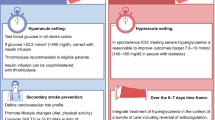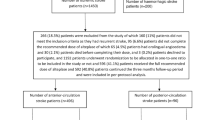Abstract
Background
Hyperglycemia in hospitalized patients is related to increased morbidity and mortality, we determine if stress hyperglycemia, as assessed by the stress hyperglycemia ratio (SHR) index, increases the risk of adverse events in diabetic and non-diabetic AIS (acute ischemic stroke) patients following EVT (endovascular treatment).
Methods
We retrospectively analyzed data of 209 patients who achieved complete recanalization. SHR was defined as [FPG (mmol/L)/HbA1c (%)]. This study comprised 130 non-diabetic AIS patients and 79 people with diabetes, and they were categorized into three different groups based on SHR (Q1–Q3) tertiles. The primary outcome was futile recanalization, characterized as a 3-month modified Rankin scale score (mRS) of 3–6. Multivariable logistic regression analyses were utilized to calculate the relationship between stress hyperglycemia and poor outcomes.
Results
Non-diabetic patients showed statistically significant differences in the proportion of 3-month all-cause mortality (14.6% for Q1, 63.0% for Q2, 74.4% for Q3, p<0.001) and futile recanalization (2.4% for Q1, 19.6% for Q2, 37.2% for Q3, p<0.001) between the three groups. After adjusting for potential confounders, we found that the highest SHR tertile remained an independent risk factor of futile recanalization (OR 18.13, 95% CI 3.38–97.38, p = 0.001) and 3-month all-cause mortality (OR 15.9, 95% CI 1.46–173.26, p = 0.023) among non-diabetic patients. As demonstrated by restricted cubic splines, the SHR reference was 1.12.
Conclusions
Severe stress hyperglycemia independently increased the odds of futile recanalization and 3-month all-cause mortality in AIS patients receiving EVT but without diabetes.

Similar content being viewed by others
Data availability
The datasets used and/or analyzed during the current study are available from the first author upon reasonable request.
References
Bhaskar S, Stanwell P, Cordato D, Attia J, Levi C (2018) Reperfusion therapy in acute ischemic stroke: dawn of a new era? BMC Neurol. 18:8
Mehta A, Fifi JT, Shoirah H, Singh IP, Shigematsu T, Kellner CP, De Leacy R, Mocco J, Majidi S (2021) National trends in utilization and outcome of endovascular thrombectomy for acute ischemic stroke in elderly. J Stroke Cerebrovasc Dis. 30:105505
Hussein HM, Saleem MA, Qureshi AI (2018) Rates and predictors of futile recanalization in patients undergoing endovascular treatment in a multicenter clinical trial. Neuroradiology. 60:557–563
Chen R, Ovbiagele B, Feng W (2016) Diabetes and stroke: epidemiology, pathophysiology, pharmaceuticals and outcomes. Am J Med Sci. 351:380–386
Bruno A, Biller J, Adams HP, Clarke WR, Woolson RF, Williams LS et al (1999) Acute blood glucose level and outcome from ischemic stroke. Neurology. 52:280–284
Capes SE, Hunt D, Malmberg K, Pathak P, Gerstein HC (2001) Stress hyperglycemia and prognosis of stroke in nondiabetic and diabetic patients: a systematic overview. Stroke. 32:2426–2432
Roberts GW, Quinn SJ, Valentine N, Alhawassi T, O'Dea H, Stranks SN et al (2015) Relative hyperglycemia, a marker of critical Illness: introducing the stress hyperglycemia ratio. J Clin Endocrinol Metab. 100:4490–4497
Merlino G, Smeralda C, Gigli GL, Lorenzut S, Pez S, Surcinelli A et al (2020) Stress hyperglycemia is predictive of worse outcome in patients with acute ischemic stroke undergoing intravenous thrombolysis. J Thromb Thrombolysis. 51:2252
Ngiam JN, Cheong CWS, Leow AST, Wei YT, Thet JKX, Lee IYS et al (2022) Stress hyperglycaemia is associated with poor functional outcomes in patients with acute ischaemic stroke after intravenous thrombolysis. QJM. 115:7–11
Zhu B, Pan Y, Jing J, Meng X, Zhao X, Liu L et al (2019) Stress hyperglycemia and outcome of non-diabetic patients after acute ischemic stroke. Front Neurol. 10:1003
Van den Berghe G, Wilmer A, Hermans G, Meersseman W, Wouters PJ, Milants I et al (2006) Intensive insulin therapy in the medical ICU. N Engl J Med. 354:449–461
Meyfroidt G, Keenan D, Wang X, Wouters P, Veldhuis J, van den Berghe G (2010) Dynamic characteristics of blood glucose time series during the course of critical illness: effects of intensive insulin therapy and relative association with mortality. Crit Care Med. 38:1021–1029
Merlino G, Pez S, Tereshko Y, Gigli GL, Lorenzut S, Surcinelli A et al (2022) Stress hyperglycemia does not affect clinical outcome of diabetic patients receiving intravenous thrombolysis for acute ischemic stroke. Front Neurol. 13:903987
Chen X, Liu Z, Miao J, Zheng W, Y Ang Q, Ye X et al (2019) High stress hyperglycemia ratio predicts poor outcome after mechanical thrombectomy for ischemic stroke. J Stroke Cereb Dis. 28:1668–1673
Powers WJ, Rabinstein AA, Ackerson T, Adeoye OM, Bambakidis NC, Becker K et al (2018) 2018 guidelines for the early management of patients with acute ischemic stroke: a guideline for healthcare professionals from the American heart association/American stroke association. Stroke. 49:e46–e110
Yoo AJ, Simonsen CZ, Prabhakaran S, Chaudhry ZA, Issa MA, Fugate JE et al (2013) Refining angiographic biomarkers of revascularization: improving outcome prediction after intra-arterial therapy. Stroke. 44:2509–2512
Adams HP, Bendixen BH, Kappelle LJ, Biller J, Love BB, Gordon DL et al (1993) Classification of subtype of acute ischemic stroke. Definitions for use in a multicenter clinical trial. TOAST. Trial of Org 10172 in Acute Stroke Treatment. Stroke. 24:35–41
Zaidat OO, Yoo AJ, Khatri P, Tomsick TA, von Kummer R, Saver JL et al (2013) Recommendations on angiographic revascularization grading standards for acute ischemic stroke: a consensus statement. Stroke. 44:2650–2663
Wityk RJ, Pessin MS, Kaplan RF, Caplan LR (1994) Serial assessment of acute stroke using the NIH Stroke Scale. Stroke. 25:362–365
Barber PA, Demchuk AM, Zhang J, Buchan AM (2000) Validity and reliability of a quantitative computed tomography score in predicting outcome of hyperacute stroke before thrombolytic therapy. The Lancet. 355:1670–1674
Zhang X, Yuan K, Wang H, Gong P, Jiang T, Xie Y (2020) Nomogram to predict mortality of endovascular thrombectomy for ischemic stroke despite successful recanalization. J Am Heart Assoc. 9:e014899
Shen CL, Xia NG, Wang H, Zhang WL (2022) Association of stress hyperglycemia ratio with acute ischemic stroke outcomes post-thrombolysis. Front Neurol. 12:785428
Pan H, Lin C, Chen L, Qiao Y, Huang P, Liu B et al (2021) Multiple-factor analyses of futile recanalization in acute ischemic stroke patients treated with mechanical thrombectomy. Front Neurol. 12:704088
Boonen E, van den Berghe G (2014) Endocrine responses to critical illness: novel insights and therapeutic implications. J Clin Endocrinol Metab. 99:1569–1582
American Diabetes Association (2014) Standards of medical care in diabetes−2014. Diabetes Care. 37:S14–S80
Mi D, Li Z, Gu H, Jiang Y, Zhao X, Wang Y et al (2022) Stress hyperglycemia is associated with in-hospital mortality in patients with diabetes and acute ischemic stroke. CNS Neurosci Ther. 28:372–381
Dávalos A, Cobo E, Molina CA, Chamorro A, de Miquel MA, Román LS et al (2017) Safety and efficacy of thrombectomy in acute ischaemic stroke (REVASCAT): 1-year follow-up of a randomised open-label trial. Lancet Neurol. 16:369–376
Luitse M, Biessels G, Rutten G, Kappelle LJ (2012) Diabetes, hyperglycaemia, and acute ischaemicstroke. Lancet Neurol. 11:261–271
Robbins NM, Swanson RA (2014) Opposing effects of glucose on stroke and reperfusion injury: acidosis, oxidative stress, and energy metabolism. Stroke. 45:1881–1886
Oliver EMF, Opie LH (1994) Effects of glucose and fatty acids on myocardial ischaemia and arrhythmias. Lancet. 343:155–158
Kamada H, Yu F, Nito C, Chan PH (2007) Influence of hyperglycemia on oxidative stress and matrix metalloproteinase-9 activation after focal cerebral ischemia/reperfusion in rats: relation to blood-brain barrier dysfunction. Stroke. 38:1044–1049
Chang MW, Huang CY, Liu HT, Chen YC, Hsieh CH (2018) Stress-induced and diabetic hyperglycemia associated with higher mortality among intensive care unit trauma patients: cross-sectional analysis of the propensity score-matched population. Int J Environ Res Public Health. 15:992
Johnston KC, Bruno A, Pauls Q, Hall CE, Barrett KM, Barsan W et al (2019) Intensive vs. standard treatment of hyperglycemia and functional outcome in patients with acute ischemic stroke: the SHINE randomized clinical trial. JAMA. 322:326–335
Krinsley JS, Meyfroidt G, van den Berghe G, Egi M, Bellomo R (2012) The impact of premorbid diabetic status on the relationship between the three domains of glycemic control and mortality in critically ill patients. Curr Opin Clin Nutr Metab Care. 15:151–160
Lima FO, Furie KL, Silva GS, Lev MH, Camargo ÉCS, Singhal AB et al (2014) Prognosis of untreated strokes due to anterior circulation proximal intracranial arterial occlusions detected by use of computed tomography angiography. JAMA Neurol. 71:151–157
Acknowledgments
We thank all the participants in the study and all the staff members. Our study has no support.
Author information
Authors and Affiliations
Contributions
All authors have given final approval of the version to be published. In detail: Zhengyang Wang was responsible for the concept and design of the study, data collection and analysis, and the first draft of the paper and further manuscript; Lin Fan was responsible for all aspects of the work in ensuring that questions related to the accuracy.
Corresponding author
Ethics declarations
Ethics approval and consent statement
The study was approved by the Taizhou People’s Hospital Ethics Committee. No informed consent was required due to the retrospective nature.
Conflict of interest
The authors declare no competing interests.
Additional information
Publisher’s note
Springer Nature remains neutral with regard to jurisdictional claims in published maps and institutional affiliations.
Rights and permissions
Springer Nature or its licensor (e.g. a society or other partner) holds exclusive rights to this article under a publishing agreement with the author(s) or other rightsholder(s); author self-archiving of the accepted manuscript version of this article is solely governed by the terms of such publishing agreement and applicable law.
About this article
Cite this article
Wang, Z., Fan, L. Does stress hyperglycemia in diabetic and non-diabetic acute ischemic stroke patients predict unfavorable outcomes following endovascular treatment?. Neurol Sci 44, 1695–1702 (2023). https://doi.org/10.1007/s10072-023-06625-y
Received:
Accepted:
Published:
Issue Date:
DOI: https://doi.org/10.1007/s10072-023-06625-y




